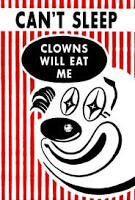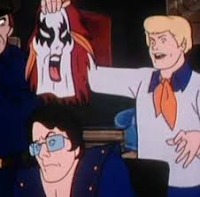 There are moments when paranoia grips my throat so tightly I can’t breathe…when my mind is paralyzed with the thought that someone else out there…someone else laboring alone in her own, similarly sized and ill-equipped writing closet is writing about the very same thing I am! But I had the idea first! Didn’t I? Not fair!Here’s my interior monologue for these moments: Oh, why bother? Someone who probably has an uncle in the executive suites of a major publishing house has already signed a deal on the exact same topic…I’ll just refresh my Facebook page, or check out a montage of all -time funniest Rodney Dangerfield clips on YouTube whilst donning my tinfoil hat to prevent those other writers from reading my mind and stealing any more of my ideas!
There are moments when paranoia grips my throat so tightly I can’t breathe…when my mind is paralyzed with the thought that someone else out there…someone else laboring alone in her own, similarly sized and ill-equipped writing closet is writing about the very same thing I am! But I had the idea first! Didn’t I? Not fair!Here’s my interior monologue for these moments: Oh, why bother? Someone who probably has an uncle in the executive suites of a major publishing house has already signed a deal on the exact same topic…I’ll just refresh my Facebook page, or check out a montage of all -time funniest Rodney Dangerfield clips on YouTube whilst donning my tinfoil hat to prevent those other writers from reading my mind and stealing any more of my ideas!
I’ve taught creative writing courses and in my experience, there’s always a student in an intro class who pulls a little trick in his short story, thinking he’s the first to do it. The narrator was actually dead all along! It was all a DREAM! These students are crushed when they find out they are not so very clever, that in fact those tricks have been done so many times they’ve made the top ten list of cliches to avoid in your writing. I know they’re crushed to hear this, because I was one of these students a long time ago, and I committed BOTH of these embarrasing mistakes.
That big-reveal ending? It’s nothing new.
Personal example: I recently penned a little food review, hoping to get it into McSweeneys, my favorite humor site and a place where I’ve published previously. After not hearing anything back after a couple months, I logged on to their site to find…are you kidding me?… a review of the same exact product, some tasteless vitamin-packed cookies. Out of all the foods in the world? Someone else chose the same one as me for a mock review for this particular magazine? After following up with the editor, he admitted he hadn’t read my review yet, and ended up publishing it anyway. (click link, then scroll down a bit)
It’s hard enough to realize you’re being scooped on brief pieces like this that might only take a morning to produce. Much harder to think that after years of working on a novel, you may be told, oh, I’ve seen too much of this lately. Writers have to put all this out of their minds to get the work done. We have to sit down every day and write something we’re passionate about, ignoring the current marketing trends, which will surely have cycled through to something else by the time we’re finished. On some level, we’re all just muddling around, building on the same basic ideas over and over, the same story lines. Perhaps you’ve heard that there are only seven universal plots (The Quest, Rags to Riches, etc.)?
Of course there’s plenty of debate about this, but when I consider that tiny number, it gives me pause. I become less concerned with thinking up the next best thing, less concerned with protecting my thoughts with tin, and more concerned with telling my story, whatever story it is I’m working on, in the only way I know how, infusing it with details only I can. If I’m not going to be the first to do something, I can try to be the best. Maybe my story will indeed fall into one of those “universal plots,” but my goal is to make it seem fresh to the reader. I can save my tinfoil for something else. Baked potatoes, anyone?

Congratulations on the McSweeney's publication!
I find that I have the same kind of paranoia about getting scooped on my dissertation topic. Of course, if I'd just finish the damn thing and defend it before other people working on similar topics do then I wouldn't have to worry so much about it, but then I'd be depriving myself of all this delicious procrastinatio… erm… writing inspiration. Yes.
Hope all is well with you!
Oh, yes, Elizabeth, if I spent the hours writing that I do worrying about things like this, I'm be damn near prolific!
Congrats on the McSweeney's publication!
I had something like this happen with one of my projects (almost ready for query). First, while doing some research, I found a work of fiction that looked suspiciously like mine–it was crushing. I read this other book and realized that the similarities were superficial at best, and that I was telling a very different story. A few months later, I saw a commercial for a new TV show that looked even more like my new book. Again, though, my story is very different, offering what I hope is a unique take on the situation.
That's what I figure, Jeff. Someone else might have a similar topic, but the way you tell it is yours alone. Good luck with it!